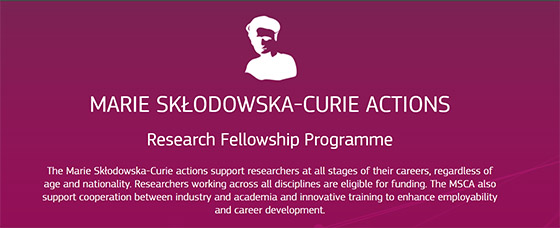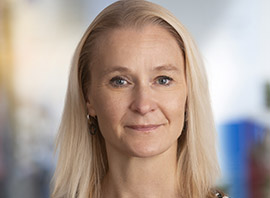MSCA – supporting researcher mobility and career development

The Marie Skłodowska-Curie Actions (MSCA) programme is the European Commission’s flagship for mobility training of researchers as well as the development of doctoral programmes with a strong structuring effect on participating institutions. On 27 May, although the dates are still tentative, the calls should open for Postdoctoral Networks and Doctoral Networks in Horizon Europe.
Mia Brandelius, Research advisor at KTH Research Support Office shares what is new in the MSCA grants for mobility, collaboration and sharing of ideas within research disciplines and society.
Why should researchers and staff at KTH take an interest in the MSCA programme?
- The grants provided by MSCA are available for all stages of a researcher’s career and there is funding for staff as well. Fellows include PhD candidates and those carrying out more advanced research.
- The main aim is to support researchers in their career development and provide opportunities for mobility and collaboration in Europe and other parts of the world. However, there are also grants for administrative and technical staff at universities who can apply for a staff exchange.

What is most challenging or rewarding in your daily work as an MSCA research advisor?
- The processes take months so I spend a lot of time supporting the applicants. Having a few years of experience in this now and my background, a Master of Laws with a focus on EU-law helps in many situations.
- All applicants are welcome to contact me, and I strongly encourage them to do so, for “pre-award” support. I try to help in strengthening a project application so that it will be funded in very stiff competition since MSCA funding is highly sought after. Then, at some point, if the project receives funding, we celebrate but also roll up our sleeves and get to work on the contracting phase and aim to make the best possible foundation, by establishing agreements, including financial- and HR-staff at the schools for the project to run smoothly throughout its entire life cycle.
- I must stress that the outcomes of these excellent projects are the most rewarding part for all involved as the research is cutting-edge, of the highest possible quality and many have an impact on society as a whole. I consider it a true privilege to even have the smallest of parts in these projects tackling ground-breaking research in fields ranging from health- and cancer research to sustainability to name but a few.
What is the scope of the Doctoral Networks and what should applicants focus on?
The MSCA Doctoral Networks are set up to train doctoral candidates to be able to face current and future challenges and to convert knowledge and ideas into products and services for economic and social benefit.
- KTH has a good record of receiving grants to coordinate these networks, usually 8-10 per call, i.e. a high approval rate. However, the applications need to be well prepared as the scores for approval have been as high as 96-100 in the recent years. RSO will certainly try to provide guidance in the application phase in close dialogue with the applicant at KTH.
- Following the EC’s commitment to tackle climate change and related challenges, the Commission has published the MSCA Green Charterwhich lays down a set of general principles and objectives that promote the sustainable implementation of research activities in line with the European Green Deal, the United Nation’s 2030 Agenda and the Sustainability Development goals.
What should researchers and hos organisations know about Postdoctoral Fellowships?
The MSCA Postdoctoral Fellowships are for researchers holding a PhD, wishing to acquire new skills through advanced training, international, interdisciplinary and inter-sectoral mobility.
- The Fellowships present a great opportunity to boost researchers’ careers by working abroad and for KTH to host a Postdoctoral student of the highest quality and this opportunity certainly adds competence and perspectives to potential research groups and projects. The PostDoctoral student needs to have a Supervisor at KTH, and potentially a co-supervisor at another party in- or outside Europe.
- Many of the recently approved projects have chosen co-supervisors in the U.S., for instance at Stanford University, Harvard University and University of Berkeley. RSO helps in the pre-award phase by adding relevant and necessary information to the application such as previous participation from KTH in this action, and field/area of choice, aids in how to address ethical issues and much more.
The MSCA Staff Exchange programme . who can apply for this?
- The staff exchange action is probably less known at KTH but a chance to build relations with other universities or academic institutions on various levels. In order to be eligible for funding you need to be employed at KTH since this action does not provide much funding. It funds the costs of the exchange, which is an excellent way to make new contacts or gain insights related to your career by job shadowing.
The European Researchers’ Night action is now called MSCA and Citizens – how come?
- It is to underline how MSCA endorses all aspects of Open Science and Responsible Research and Innovation (RRI) through engaging society, ensuring open access to research outcomes, encouraging formal and informal science education.
- The main feature is still The European Researchers‘ Night, which is a great opportunity to show the impact of researchers’ work on citizens’ daily lives. In the wider Stockholm area the non-profit organization “Vetenskap & Allmänhet” (Public and Science) is the body that applies for the grant and organizes the annual event called “ForskarFredag” that reaches out to schools and the public.
MSCA COFUND funds the sharing of best practices of the MSCA?
- Yes, this action co-finances new or existing doctoral programmes and postdoctoral fellowship schemes with the aim of spreading the best practices of the MSCA. Each COFUND proposal should have one main participant such as a: government ministry, regional authority, funding agency, university (as a whole), research organization or enterprise.
So overall, MSCA is about improving work conditions for researchers in EU?
- Yes and MSCA has synchronised its programmes to the European Charter for Researchers and Code of Conduct for the Recruitment of Researchers, which promotes open, merit-based and transparent recruitment and the provision of attractive working and employment conditions. KTH applied to get approval for aligning to these initatives and was awarded HR Excellence in Research on 7 May 2021! This will facilitate for KTH researchers in applying for these grants.
- And the Nordic Five Tech, an alliance of the Leading Nordic Technical Universities, are also applying a streamlined process for MSCA. This will make it easier for the applying researchers to know what is most important. Information seminars will provide opportunities for direct, hands-on support on applications and related questions. Sign up for the workshop on 3 June - there are a limited number of "seats" so don´t wait!
